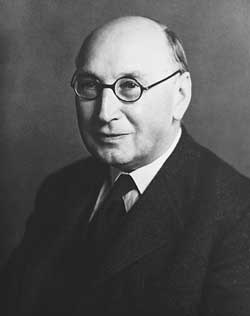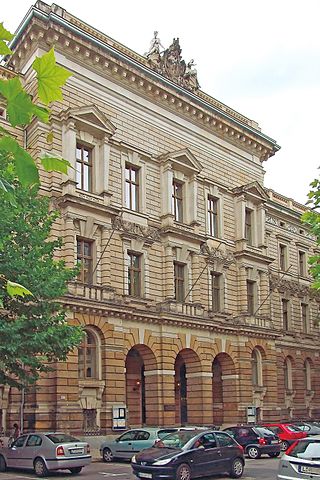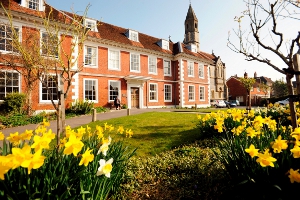Related Research Articles

The Sydney Conservatorium of Music is a heritage-listed music school in Macquarie Street, Sydney, New South Wales, Australia. It is one of the oldest and most prestigious music schools in Australia. Located adjacent to the Royal Botanic Gardens on the eastern fringe of the Sydney central business district, the conservatorium is a faculty of the University of Sydney, and incorporates the community-based Conservatorium Open Academy and the Conservatorium High School. In addition to its secondary, undergraduate, post-graduate and community education teaching and learning functions, the conservatorium undertakes research in various fields of music. The building was added to the New South Wales State Heritage Register on 14 January 2011.

Herbert Norman Howells was an English composer, organist, and teacher, most famous for his large output of Anglican church music.

Charles Wood was an Irish composer and teacher; his students included Ralph Vaughan Williams at Cambridge and Herbert Howells at the Royal College of Music. He is primarily remembered and performed as an Anglican church music composer, but he also wrote songs and chamber music, particularly for string quartet.

Sir William Henry Harris was an English organist, choral trainer and composer.

The University of Music and Theatre "Felix Mendelssohn Bartholdy" Leipzig is a public university in Leipzig. Founded in 1843 by Felix Mendelssohn as the Conservatorium der Musik , it is the oldest university school of music in Germany.

The Royal School of Church Music (RSCM) is a Christian music education organisation dedicated to the promotion of music in Christian worship, in particular the repertoire and traditions of Anglican church music, largely through publications, training courses and an award scheme. The organisation was founded in England in 1927 by Sir Sydney Nicholson and today it operates internationally, with 8,500 members in over 40 countries worldwide, and is the largest church music organisation in Britain.
Herbert Whitton Sumsion was an English musician who was organist of Gloucester Cathedral from 1928 to 1967. Through his leadership role with the Three Choirs Festival, Sumsion maintained close associations with major figures in England's 20th-century musical renaissance, including Edward Elgar, Herbert Howells, Gerald Finzi, and Ralph Vaughan Williams. Although Sumsion is known primarily as a cathedral musician, his professional career spanned more than 60 years and encompassed composing, conducting, performing, accompanying, and teaching. His compositions include works for choir and organ, as well as lesser-known chamber and orchestral works.

The Elder Conservatorium of Music, also known as "The Con", is Australia's senior academy of music and is located in the centre of Adelaide, the capital of South Australia. It is named in honour of its benefactor, Sir Thomas Elder. Dating in its earliest form from 1883, it has a history in professional training for musical performance, musical composition, research in all fields of music, and music education. The Elder Conservatorium of Music and its forerunners have been parts of the University of Adelaide since the early 1880s.

Edgar Leslie Bainton was a British-born, latterly Australian-resident composer. He is remembered today mainly for his liturgical anthem And I saw a new heaven, a popular work in the repertoire of Anglican church music, but during recent years Bainton's other musical works, neglected for decades, have been increasingly often heard on CD.

The Schulich School of Music is one of the constituent faculties of McGill University in Montreal, Quebec, Canada. It is located at 555, rue Sherbrooke Ouest. The faculty was named after benefactor Seymour Schulich.
Graeme John Koehne, is an Australian composer and music educator. He is best known for his orchestral and ballet scores, which are characterised by direct communicative style and embrace of tertian harmony. His orchestral trilogy Unchained Melody, Powerhouse, and Elevator Music makes allusions to Hollywood film score traditions, cartoon music, popular Latin music and other dance forms.

William Lovelock was an English classical composer and pedagogue who spent many years in Australia. He was the first Director of the Queensland Conservatorium of Music in Brisbane, and later became the chief music critic for The Courier-Mail newspaper while developing an independent career as a composer.
Wilfrid Holland was a British born composer, choral and orchestral conductor, pianist and teacher who spent the last 45 years of his life based In Canberra, Australia.

The UWA Conservatorium of Music is a teaching and research school offering undergraduate and postgraduate study in music at the University of Western Australia. It is located at the north-east corner of the Crawley campus and teaches predominately Classical music, with focus in the undergraduate curriculum on performance, as well as overall strength in musicology, composition and electronic music. In 2016, UWA entered the top 100 "Performing Arts" institutions in the world, and in 2017 and 2018 the School improved its ranking to enter the top 50 in the world, according to the QS World University Rankings. The Conservatorium is also well regarded in research. Under the research code "19 Studies in Creative Arts and Writing", the Conservatorium was rated as "4 - Above World Standard" by the Australian Research Council in 2018. Previously, the name of the organisation has been the UWA Department of Music, and the UWA School of Music.
Rupert Edward Elessing Jeffcoat is a Scottish organist, composer and Anglican priest.
Edward Maurice Besly was an English composer, conductor, schoolteacher, organist and arranger best known for his popular ballads, The Second Minuet and Time, You Old Gipsy Man. More ambitious vocal pieces were the Four Poems Op 24, Charivaria and his setting of Christina Rossetti's The shepherds had an angel for soprano solo and chorus.
David Reeves is an Australian composer, conductor and organist. He began his professional career as a concert organist in the early 1960s, turning to conducting and composition some ten years later. He is the composer of original modern music that bridges commercial and classical styles. 'An original Australian Musical Trailblazer' - Tommy Tycho OBE AM - Channel 9 - Star-Sound Recording Studios 1992.
Joshua Ives was the first Professor of Music at the University of Adelaide and founder of the Elder Conservatorium of Music.
John Adam Horner OBE FRCO LRAM was a Scottish organist, choirmaster and music teacher in South Australia.
Peter John Tregear OAM is an Australian musicologist, author and performer.
References
- 1 2 3 4 5 6 7 8 9 10 11 "Paul Paviour". Australiancomposers.com.au. Retrieved 15 November 2014.
- ↑ "Paviour, Paul". Worldcat.org. Retrieved 15 November 2014.
- ↑ Bedford Modern School, A History, Andrew Underwood (1981), (updated 2010)
- ↑ The Eagle, The Magazine of Bedford Modern School, Volume 40 (4), 1976-77, Number 287, p.139
- 1 2 Paul Scott-Williams. "In conversation with - Paul Paviour OAM". Thegrc.com.au. Retrieved 15 November 2014.
- ↑ "Paul Paviour : Represented Artist Profile : Australian Music Centre". Australianmusiccentre.com.au. Retrieved 15 November 2014.
- ↑ Paul Paviour, Requiem Survey.